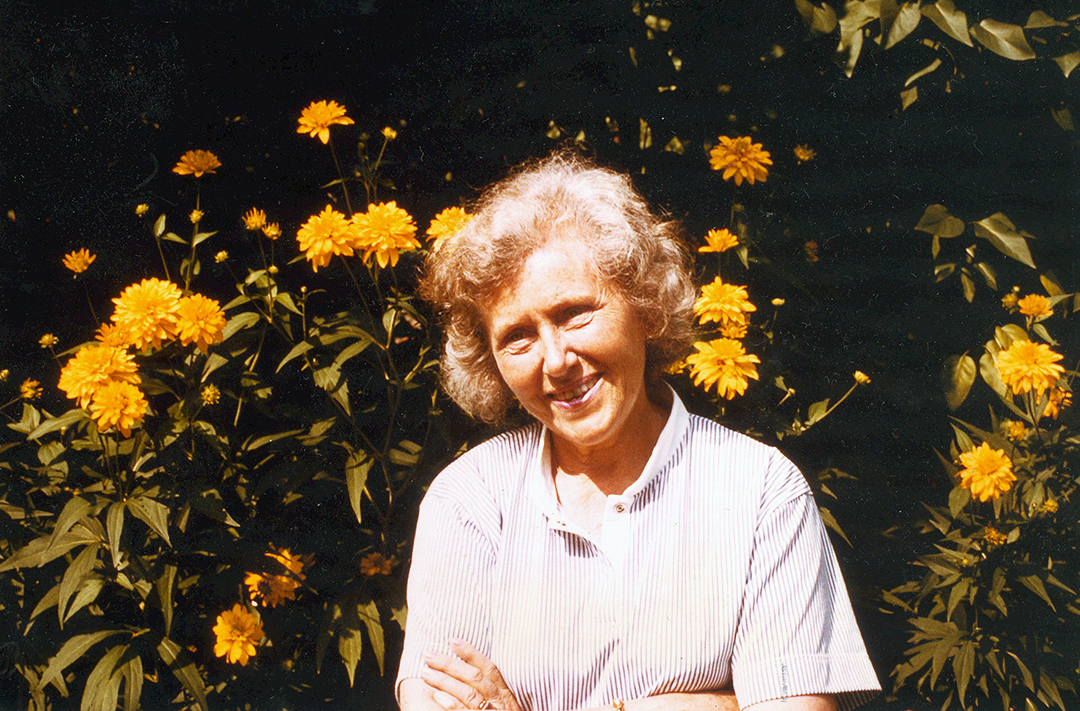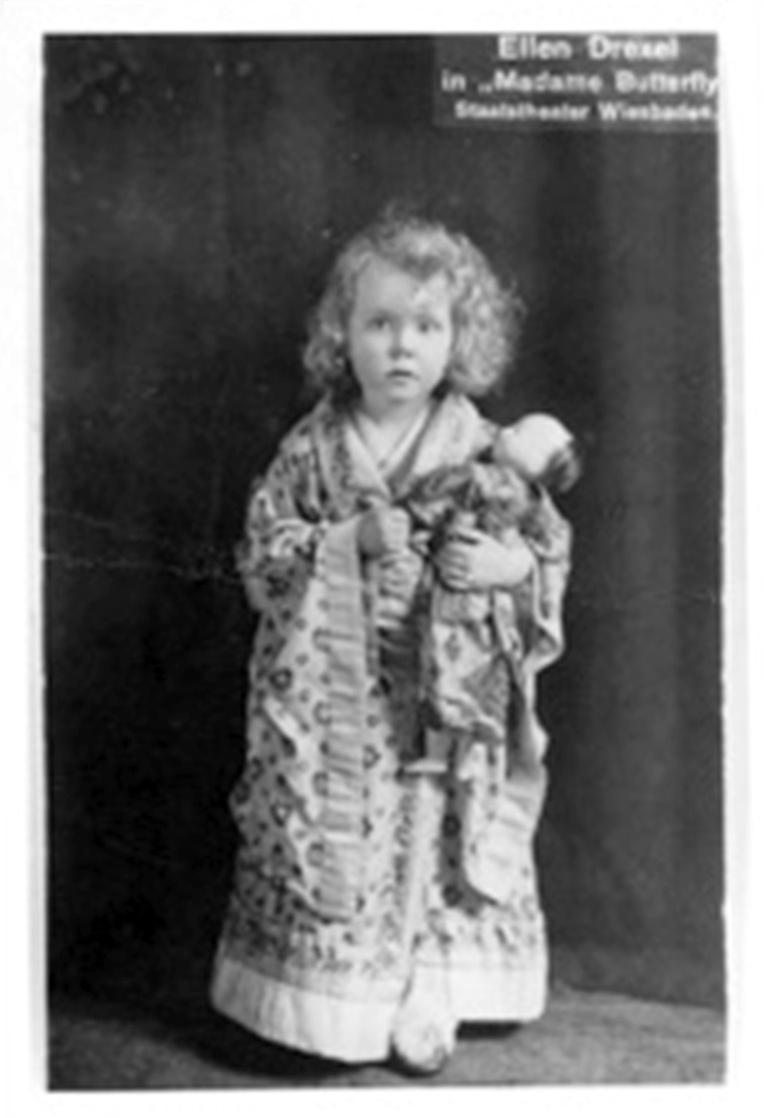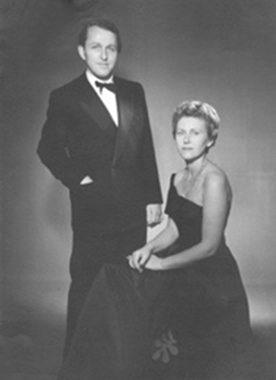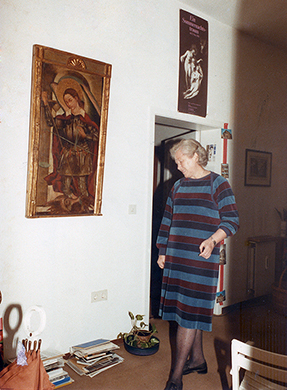Ellen Drexel
Ellen Drexel
Ellen Drexel (born August 20, 1919 in Wiesbaden, † April 17, 2002 in Eppstein in Taunus) was a ballet dancer from 1923 to 1943. She revised her diaries and notebooks until 1999, collecting historical articles and systematically expanding her knowledge of the details and background of National Socialism and the Holocaust.

Ellen Drexel Würzburg Weissenburg 8 August 1982 © GHW
After their divorce, she revised her diaries and notebooks until 1999, collecting historical articles and systematically expanding her knowledge of the details and background of National Socialism and the Holocaust. contents • 1 family history • 2 lives • 3 literature • 4 individual certificates Family History [edit | Edit] Ellen Drexel was the daughter of the wine merchant Adolf Heinrich Drexel (born July 23, 1887 in Vockenhausen (Eppst.), † October 2, 1940 in Wiesbaden). Adolf Heinrich Drexel was the third of four children of the leather manufacturer Georg Christian Drexel and Elisabeth Drexel, b. Roth. His brother was the avant-garde painter Hans Christof Drexel. Ellen Drexel’s mother was Thora Auguste Franziska Drexel, nee Nissen (born March 6, 1891 in Hamburg, † October 22, 1953 in Wiesbaden). Thora Drexel worked as a teacher in Wiesbaden and was interested in music, literature and theater, influenced by the high educational level of her family. She was the daughter of the couple Otto and Dorothea Christin-Karoline, called Thora Nissen, born Weihmann. Ellen’s grandfather came from the wealthy Hamburg merchant Nissen family. Her grandmother, Thora, played a special role in the family, writing poems, diaries, and letters to her parents in Hamburg from January 1877 to June 1881. At the time she was living in Burghersdorf, South Africa, where Otto Nissen was a successful wool merchant. In 1885 she reported in detail about a trip to Switzerland in an illustrated diary.
Picture : The gravestone of Ellen Drexel in Cerro Maggiore near Milan / Italy
Life In this cultural environment, Ellen Drexel grew up. The mother’s library soon aroused her interest in literature. Ellen Drexel’s career as a dancer and mime began early, as early as 1923 – when she was four years old – in “Madame Butterfly” at the Wiesbaden State Theater. Her ballet and pantomime career led Ellen Drexel from Wiesbaden to Darmstadt, Wroclaw and from 1941 to the Staatsoper Unter den Linden in Berlin. During a guest performance of the Staatsoper Unter den Linden in Rome, she met Wolfgang Wagner, the son of the Bayreuth festival director Winifred Wagner, who was then an assistant to Heinz Tietjen, the director-general of all the Prussian state theaters, which were formally under Hermann Göring. Then Ellen Drexel moved into the apartment of Wolfgang Wagner in the Berlin Muckstraße, became officially Wagner’s fiancée and gave up her career as a ballet dancer. On April 11, 1943 Wolfgang Wagner and Ellen Drexel married in Villa Wahnfried in Bayreuth in the presence of the Wagner family. With the marriage Ellen dropped her maiden name. Adolf Hitler had roses brought to the bridal couple’s wedding. Ellen Wagner survived the bombing of their Berlin apartment and on 7th April, 1945, while she was in a state of advanced pregnancy, she was in Villa Wahnfried when this building was also destroyed by a bomb.
Ellen Wagner’s daughter, Eva, was born a few days later, on April 14, 1945, in Winifred Wagner’s country house in Oberwarmensteinach in the Fichtelgebirge. Ellen Wagner was witness to the occupation of the destroyed Villa Wahnfried by US troops and witnessed the denazification proceedings against her mother-in-law Winifred Wagner on July 2, 1947 as an offender of Group II. In an appeal at the end of 1948 she was classified only as a lesser offender of Group III.
On April 13, 1947, Ellen Wagner’s son Gottfried Helferich was born. The family lived at this time in the gardener’s cottage on the Villa Wahnfried estate, overlooking the American officer’s casino in the Siegfried Wagner House. On January 24, 1955, the family moved to Villa Festspielhügel 3. This house was on Parsifal Street next to the “Aryanized” villa of the Gauleiter of the Bavarian Ostmark, Fritz Wächtler. After the war, Ellen Wagner accompanied her husband on all business trips to sponsors and supporters in German business, politics, culture and the media to rebuild the bankrupt family-owned company Bayreuther Festspiele, but her main work was to care for her children. From 1945 Ellen Wagner kept a diary in note form.
Picture Gottfried H.Wagner July 2017 in front of a part of the Ellen Drexel diaries and notebooks
She promoted the studies of her son on the National Socialist persecution of Kurt Weill and the Holocaust, which had a lasting effect on his professional development. After her divorce in July 1976 – the year of the 100th anniversary of the Bayreuth Festival – she began to write down her life and to critically and self-critically comment on all remaining diaries. In 1977 she intensified her contact with her uncle Hans Christoph Drexel, who had been forbidden to work as a painter in Nazi Germany, and this awoke her interest in the formerly “degenerate art”. Her Drexel family was always of particular importance to her. After strokes and a cancer diagnosis, she lived from 1999 until her death on April 17, 2002 in the senior residence Main-Taunus-Kreis in Eppstein i. T. She was blessed at the South Cemetery in Wiesbaden; her ashes, according to her wishes, were buried on May 27, 2002 in the cemetery in Cerro Maggiore near Milan. All diaries and notebooks as well as essential documents of the Wagner and Drexel-Nissen families can be found in the Gottfried Wagner Archive in the Zurich Central Library; they will be evaluated in the coming years. Key statements in Ellen Drexel’s notes are published in a book
Literature Ellen Drexel’s diaries and notebooks are in the Gottfried Wagner Archive of the Zurich Central Library. • Gottfried Wagner: Who does not howl with the wolf. Autobiographical records of a Wagner great-grandson. Kiepenheuer & Witsch, Cologne 1997, ISBN 3-462-02622-4 • Gottfried Wagner, Abraham Peck: Our zero hour. Germans and Jews after 1945. Family history, Holocaust and new beginning. Historical memoirs. Böhlau, Vienna, Cologne, Weimar 2006, ISBN 3-205-77335-7. (Published in the USA under the title Unwanted legacies: sharing the burden of post-genocide generations, Texas Tech University Press, 2014). • Brigitte Hamann: Winifred Wagner and Hitler’s Bayreuth. Piper, Munich 2002, ISBN 3-492-23976-5. • Jonathan Carr: The Wagner clan. Biography of a german family. Fischer, Frankfurt am Main, 2010, ISBN 978-3-596-18504-7. • Specialist literature Richard Wagner, Wagner Hitler, Wagner family, Wagner opponents and history of the Bayreuth Festival • Compare Gottfried Wagner: Thou shalt have no other gods beside me. Richard Wagner – A minefield. Propylaen, Berlin 2013, ISBN 978-3-549-07441-1.
Single references The original travel book was published in the spring of 2018 by Anita Jakob-Michaelis, Wiesbaden from the Sütterlin Script and is available as a text and is in the archives of the city of Wismar. 2. ↑ The handwritten, transcribed letter by Ralph Giordano, scanned by Gottfried H. Wagner. Ralph Giordano, Berndorfstr. 4, 50968 Cologne 29.09.1996 to Mrs. Ellen Drexel-Wagner, Höchsterstr. 2 65203 Wiesbaden Dear Ms Wagner, I have just finished the foreword to Gottfried’s book. Gottfried’s demand for sincerity in his counter-chronicle to the official Bayreuth and its representatives and the related form of dealing with family and festival history has moved me a great deal. I am glad to hear that you not only gave Gottfried insight into your autobiographical notes, but also gave him all your historical documents. l consider Gottfried the only competent and serious representative of his generation to deal responsibly with this material in the future and to protect it from being adulterated or destroyed. In order to spare Gottfried any further challenges to the genuineness of some of your donated documents from some groups, I urge you to urgently comply with Gottfried’s repeated request for a handwritten statement as follows, in order to avoid later possible legal disputes. The text would be: I hereby certify that I have given my son, dr. Gottfried H. Wagner, my autobiographical notes from 1942 until today donated. Ellen Wagner, Wiesbaden, the … October 1996 Send these lines to Gottfried as soon as possible by registered mail. As you are also concerned with the discovery of truths, I ask you, as his mother to do Gottfried this important favor soon. Yours sincerely, Ralph Giordano Sent to Gottfried H. Wagner by fax on 29. 9. 1996. Comment Gottfried Wagner: Mother Ellen immediately agreed, signed and often phoned Ralph Giordano in difficult moments after the publication of the book and crises of the mother.

Ellen Drexel 1923
First stage appearance as child of 4 years in Madame Butterfly in the State Thetre of Wiesbaden

Ellen Drexel July 1951
At the reopening of the Wagner Festival , with Wolfgang Wagner, divorced in 1976

Ellen Drexel May 1988
Ellen Drexel at the Romanstrasse in Bayreuth May 1988
